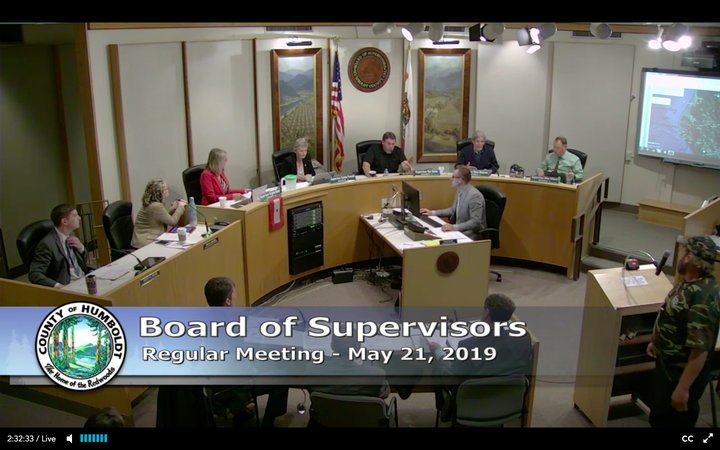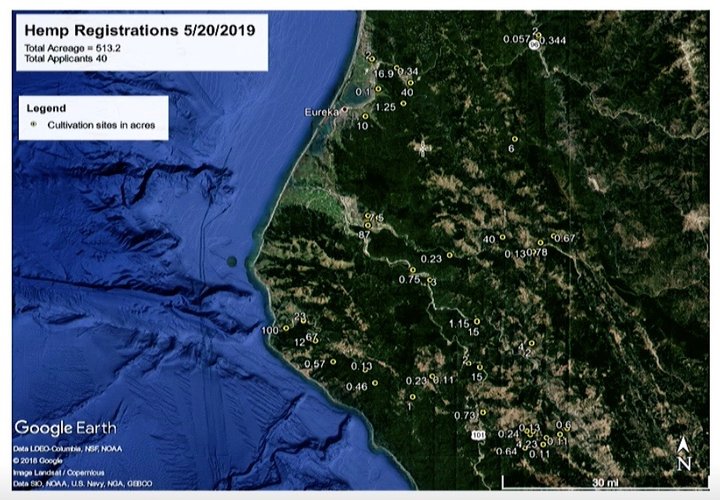
The Humboldt County Board of Supervisors hears public comments regarding a proposed new hemp moratorium. | Screenshot
PREVIOUSLY:
- County Ag Commissioner Accepting Hemp Registration Forms Ahead of Moratorium Vote
- Will a Lapse in the County’s Hemp Moratorium Inadvertently Open the Floodgates for Industrial Cultivation?
- County Looks to Extend Moratorium on Industrial Hemp Cultivation While Developing New Rules and Regulations
- Yurok Tribe Gives Thumbs-Up to Hemp: Tribal Council Moves to Legalize Non-Psychoactive Cannabis on Tribal Lands, Develop Regulations and Explore Business Opportunities Around Newly Legal Crop
# # #
If yesterday is any indication, a lot of locals want to grow hemp.
Forty people filed into the Humboldt County Agriculture Department on Monday to submit their registration paperwork with plans to grow the crop on 513 acres scattered around the county.
Take a look at this map of the proposed locations, presented at Tuesday’s Board of Supervisors meeting:

Tough to see, perhaps, but those yellow dots indicate parcels where people want to grow, and the numbers next to each dot denote the proposed cultivation acreage.
Keen-eyed observers will note that these dots generally fall into the same remote regions where marijuana gardens are plentiful, and it’s no coincidence. As Agricultural Commissioner Jeff Dolf explained to the Board of Supervisors at Tuesday’s meeting, none of the 40 hemp applicants who came into his department yesterday want to grow industrial hemp for its fiber or seeds. That type of cultivation is better suited to the flat ag lands of the Central Valley, the Great Plains or the Deep South.
No, locals are hoping to grow a variety of hemp that looks — and is cultivated — exactly like its genetic cousin, the weed for which our region is famous. This hemp is virtually devoid of the psychoactive compound THC yet still high in CBD, a compound that has sparked an industry bonanza behind claims of abundant and miraculous medical benefits.
Now that hemp has been legalized by the feds, farmers in Humboldt County (and elsewhere) see an opportunity to grow a valuable crop outside of existing state and local cannabis regulations, which they say are strangling the industry.
But not so fast. The Humboldt County Board of Supervisors today voted unanimously to establish a new 45-day moratorium on hemp cultivation, effective immediately, four days after the previous moratorium expired. The board wants to give staff enough time to develop regulations, a process that’s likely to take several months.
As with last week’s meeting, a number of people addressed the board on this issue today, with about half of them requesting free rein to grow the “miracle” crop and the other half urging caution — and a new moratorium — to protect both the environment and the county’s registered cannabis growers, who have invested thousands of dollars to become compliant.
Nate Madsen, a local environmental leader speaking only for himself, said the county’s cannabis regulations have been “extremely painful,” and when he applied for his hemp registration yesterday the atmosphere at the Ag Department was happy. People were excited to grow a federally legal crop, and Madsen said this was an opportunity to form “a new coalition” around CBD production.
“We’re on the precipice of having a whole new agricultural boom in our county,” proclaimed another commenter, a woman named Anna.
But other speakers urged caution. Scott Bauer, senior environmental scientist supervisor with the California Department of Fish and Wildlife, said he and others in the room spent a huge amount of time developing the county’s cannabis ordinance, and high-CBD hemp in the field is indistinguishable from high-THC cannabis.
“Seems like a moratorium is prudent at this time so we can understand what this crop will do for fish and wildlife,” Bauer said.
Tom Wheeler, the executive director of the Environmental Protection Information Center (EPIC), and Stephanie Tidwell, executive director of Friends of the Eel River, echoed Bauer’s call for caution — and for another moratorium.
When the matter came back to the board for discussion, Third District Supervisor Mike Wilson said folks in his district are concerned about environmental issues such as watershed impacts, roads, generators and lighting, and they’d be reluctant about green-lighting an industry with virtually none of local regulations cannabis growers are subject to.
Fourth District Supervisor Virginia Bass, who missed last week’s meeting to attend a National Association of Counties conference in Washington, D.C., said, “Boy, I had no idea this was going to go so sideways last week.” This was evidently a reference to the unexpected “no” vote on moratorium renewal from Fifth District Supervisor Steve Madrone.
Bass said she agreed with Wilson that proceeding with caution was the right approach.
Second District Supervisor Estelle Fennell also voiced support for a moratorium, saying she’d like people to work together to develop regulations that protect both cannabis farmers and CBD-hemp farmers.
Some aspiring hemp farmers have suggested in recent days that they may sue the county if staff doesn’t issue their registrations, but Deputy County Counsel Joel Ellinwood said he believes the county “would be on firm ground” in implementing a new moratorium and developing regulations for hemp cultivation.
Madrone said the calls and emails he’s gotten since last week’s meeting have been split about 50/50 between those who favor a renewed moratorium and those opposed.
“I just want to be 100 percent clear,” he said. “In no way, shape or form am I supporting an unregulated hemp market. … I also am not supportive of over-regulating.”
Calling CBD a “wonder drug,” Madrone said he’d like the county to move forward as quickly as possible “to allow small farmers to get back in the market” without burdening them with the same burdensome regulations that they’re subjected to under the Commercial Cannabis Land Use Ordinance (CCLUO).
Wilson challenged him for details. “I’m looking forward to your suggestions for what environmental regulations we should remove, specifically,” he said, noting that many of the industry rules are implemented at the state level.
Wilson made a motion to adopt the urgency ordinance establishing a new 45-day moratorium, with the understanding that staff will come back in 30 days to request another extension. Planning and Building Director John Ford has estimated that it will be September before a regulatory framework will be ready for board review.
In making the motion, Wilson suggested that staff might build the CBD hemp regulations into the existing CCLUO, perhaps granting certain regulatory exemptions to those who want to grow CBD hemp.
Fennell seconded the motion, though she said a lot of issues need to be clarified. Staff noted that there will be plenty of opportunity for public input as the regulations are developed.
The motion wound up passing unanimously, with Madrone agreeing, this time, to go along with his colleagues.
Dolf, the ag commissioner, said he would invalidate the 40 applications his office received yesterday and return the $900 fee submitted with each.
CLICK TO MANAGE